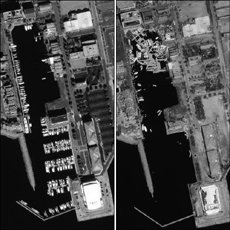Hurricane Ivan has wreaked havoc on the Caribbean and Gulf coast regions, first by slamming into Grenada Sept. 9 and then by barreling into the Gulf coast of the United States Sept. 15. The death toll is approximately 112, with 70 deaths reported in the Caribbean and 42 in the United States. Search and rescue efforts are still underway in many coastal cities, and officials expect the death toll to rise.
According to the Associated Press, Ivan is the deadliest hurricane to hit the United States since Hurricane Floyd in 1999.
In Grenada, where the Category 4 storm took the lives of 34 people, winds in excess of 155 miles per hour banged and battered poorly constructed buildings and destroyed many of the shanty towns citizens called home.
Cuba was spared a direct hit from Ivan when the storm passed through the strait between Cuba and Mexico. Officials advised cruise ships to stay out to sea, while 15,000 people evacuated the Yucatan Peninsula, according to the International Herald Tribune. Grand Cayman reported no casualties from Ivan; however, there was damage from the strong winds.
“Winds ripped the apartments like matchsticks,” one radio report from Grand Cayman said. “The whole island has taken a battering. Cars and trucks were floating away like toys.”
As of Sept. 12, forecasters were expecting Ivan to hit the Florida coast by Sept. 14. However, the storm shifted westward late Sept. 14, sparing some of the Florida coast from the projected direct hit. Three hundred miles of Gulf coastline, however, were still hit directly.
State officials in Louisiana, Mississippi, and Alabama hurried to issue mandatory evacuation plans and curfews for two million residents.
Insurance experts expect damage to be between $3 and 10 billion, compared with $11 to 13 billion in damages from Charley and Frances combined. Fallen trees, high winds, and flooding greatly contributed to the devastation experienced from the Caribbean islands to rural areas in the United States like Stokesdale, N.C., where tornados spawned by Ivan destroyed many homes.
In a report issued Sept. 17, Gulf Power in northwest Florida reported “catastrophic” damage, with 90 percent of its customers without electricity. Officials of Alabama Power reported the largest power outage in the state’s history: approximately 802,000 outages, which is double the previous record, according to the Atlanta Journal-Constitution.
Florida residents who had already braved Hurricanes Charley and Frances were once again forced to brace themselves for another hurricane. Some, like resident David Hastings, had seen enough. “I’ve been here since ’71, and I am sick of it,”he told a reporter from ABCNews.com.
Other Gulf coast residents were just thankful to be safe.
In a telephone interview Sept. 19, Theresa Pinnock of Montgomery, Ala., said, “Buffalo (N.Y.) has snow, and Montgomery has hurricanes. I am very thankful that we are okay, and our house is still in one piece” (Pinnock is a relative of this article’s writer).
The Red Cross has appealed to the public for more donations and volunteers. According to ABCNews.com, the combined cost of the hurricane season before Ivan was expected to be $50 million, about $14 million more than was donated to the agency last year. Agency officials say it is still too soon to say how much Ivan might add to the price tag.
Those who want to assist victims of Ivan should contact their local Red Cross, or call 1-800-HELP-NOW. Contributions can also be made online at Redcross.org/donate/donation-form.asp.

